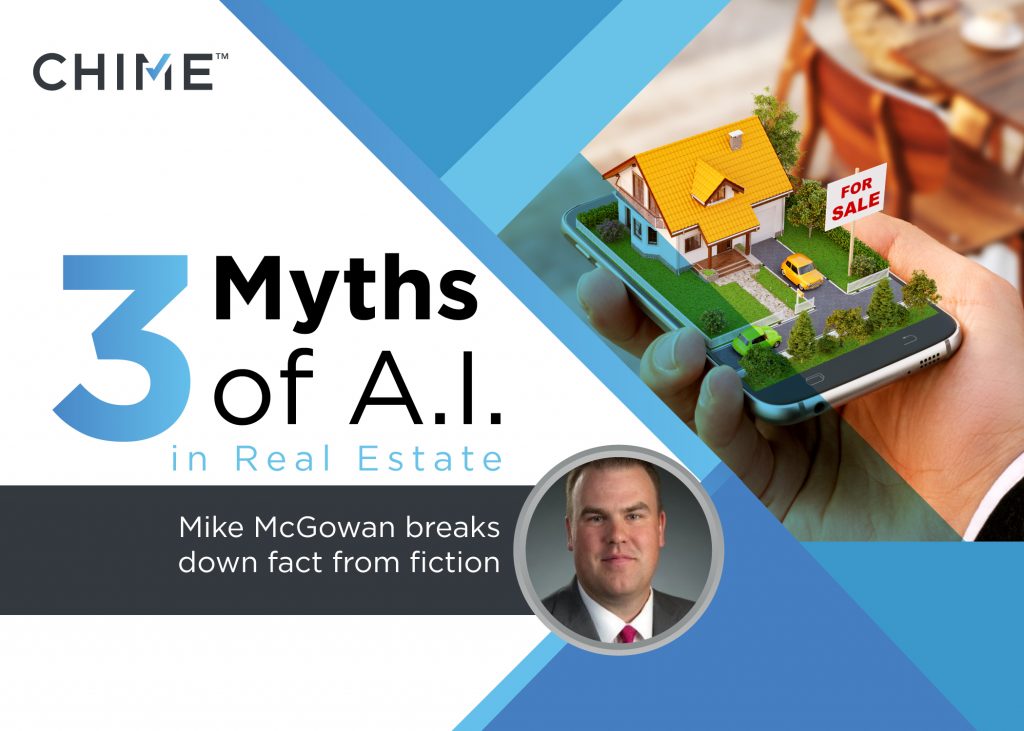Fact vs Fiction: Three Myths of AI in Real Estate

Artificial Intelligence (AI) has been a technology buzzword in the real estate market for the past 18 months. And with good reason. While the technology itself has been around for some time, brokerages and agents alike are beginning to see just how valuable AI can be – especially as they optimize their business and embrace digital innovations as the pandemic wears on.
AI is really good at synthesizing data insights and predicting behavior which means it can save real estate pros a lot of time and money as it frees up them up to focus elsewhere. The catch is that there is a lot of misinformation swirling about AI as well. How can you really use AI in your business? What will it deliver? Where does the technology end and an agent begin? Read on to hear how our own Mike McGowan separates the hype from reality.
Myth #1: AI will replace the need for agents
This thought has likely crossed your mind before. Any technology that automates a process which is historically done manually creates fear and anxiety around the human element. While it’s not unfounded there is a twist. For most innovations, AI Included, the benefit is that a process can be streamlined thus freeing up real estate professionals and brokerage team members to do high value tasks instead. For example, a 2020 report from Altus Group found that while ¾ of commercial real estate executives believe automation will eliminate some jobs, nearly the same number believe it will also create new roles that focus on delivering value. Ask yourself, is it more valuable to spend time manually integrating your lead generation system with your social media content for the month or is it more valuable to interface with clients and prospects directly? The latter delivers a better return each and every time.
AI simply cannot replace the value agents create when engaging with leads and clients. Now more than ever, homebuyers and property owners are looking for real estate professionals to engage them with real market insight and a productive, genuine relationship. AI not only makes that a reality but does so on a great scale enabling agents to focus on high-value activities and not intensive data analysis or tedious processes.
Myth #2: AI is incoming lead generation only
AI definitely has a strong role to play in lead generation. For example, deploying AI-powered chatbots on your website can help you get in touch instantly with new leads as they come in. But those inbound leads are only the beginning. From property valuation to automating back-office operations, AI can play a major role.
Our clients find lead conversion to be the biggest area of surprise. Once a prospect hits your web site AI can take over to nurture the lead. Integrating into your CRM system is where the opportunity exists to maximize conversion rates. For instance, an AI-driven automated property alert allows agents to set up parameters and flag opportunities whenever a home hits the market that fits a certain prospects’ criteria. But the agent doesn’t have to be involved when a home is flagged – they can be at another closing, at a t-ball game, or asleep while this is all happening.
Taking that a step further, AI can continue to track properties with certain characteristics for any given lead even after that lead may have said, “No thanks.” It essentially eliminates the terminology of “dead” lead – now it’s simply an immediate lead and a longer-term lead. By better understanding what a given client is after through data insight and analysis, AI is the lever that can drive conversions not just inbound leads.
Myth #3: All AI capabilities are the same
Not all AI capabilities are created equal. An AI system that tracks activity and gives real time feedback, whether it be via a prospect ‘score’ or a notification upon activity, generates a ‘propensity’ for that prospect to act. But there is a difference between a third-party AI system that must be integrated and one that is native to the system. Likely they don’t have the same functionality and for the two to communicate there must be a bridge which is not the same as a native integration. Inevitably, something is always lost in translation given the nature of how the two systems were developed. Leveraging AI tools native to an application speeds up the machine learning process (where AI gets its intelligence!) and is ultimately more efficient as data doesn’t have to be shared outside an application.
As Alexander Chandler, Berkshire Hathaway HomeServices Alexander Chandler Realty, noted in a recent Forbes story about technology innovation in real estate, “Those not harnessing AI are going to be left behind holding buggy whips.”
There is no better time to separate AI fact from fiction. Start by understanding specifically how AI technology can bolster your business, add to the value of your team, and drive the operational efficiencies you need to grow and scale in a white hot residential real estate market.
To learn more about how our unique AI technology helps realtors and brokerages just like you visit https://chime.me/feature/assistant.
Mike McGowan is VP of Sales for Chime.